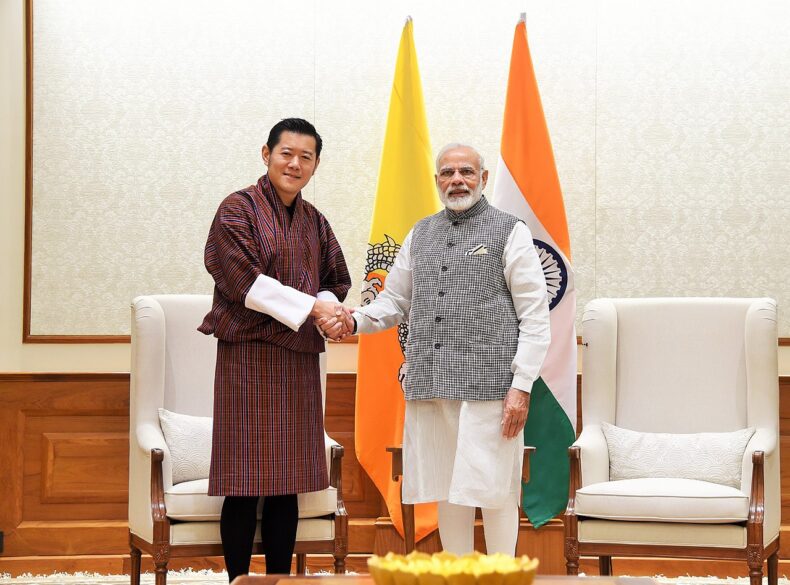Both parties will examine the bilateral collaboration between the two nations and further strengthen their bilateral partnership during the king’s visit.
Table of Contents
The invitation to the King’s visit came from President Droupadi Murmu and according to the Ministry of External Affairs, the Bhutan monarch would be joined by Dr. Tandi Dorji, the country’s foreign minister, and other important officials.
King Jigme Wangchuk‘s visit will provide India and Bhutan the chance to evaluate the full scope of their bilateral ties given their outstanding affinity and partnership, which is marked by mutual trust and understanding.

He will meet with both President Droupadi Murmu and Prime Minister Narendra Modi as well as External Affairs Minister S. Jaishankar during his visit, which is consistent with the long-standing history of regular high-level exchanges between the two nations.
In January 2024, they were also visited by Foreign Secretary Vinay Kwatra after which a parliamentary delegation from them, led by Wangchuk Namgyel, Speaker of the National Assembly of Bhutan, was received by President Murmu earlier in February 2024 at Rashtrapati Bhavan.
The President said that Bhutan will leave the group of nations known as the Least Developed Countries (LDC) this year and set out on a road to becoming a High Income Economy by 2034.
India’s long-standing ties with Bhutan
India has been Bhutan’s biggest trading partner for a long time and is still the main source of foreign investment.
The cornerstone of relations between India and Bhutan is the Treaty of Friendship and Cooperation, which the two countries signed in 1949 and renewed in February 2007. Regular high-level interactions between the two nations have strengthened the bilateral ties.
In November 2021, the Indian government officially established seven new commercial channels for transit and bilateral commerce between India and Bhutan. In addition, additional market access was made available to formally permit the export of 12 agricultural goods from Bhutan to India. Other unique exceptions/export limits were also made accessible.
Ever since their’s Five Year Plans were first introduced in the early 1960s, India has provided financial support for the country’s socioeconomic growth.

India provided them with approximately $4,500,000,000 for the 12th Five-Year Plan, including Direct Budgetary Assistance, small development initiatives, and aid for a variety of multi-sectoral projects.
According to our “Neighborhood First Strategy,” fresh market access has been provided for three commodities from India to (Tomato, Onion, and Okra) and five agricultural products that include ginger, areca nut, mandarin, apple, and potato, from Bhutan to India.
In keeping with the unique and special relationships between India and Bhutan, India made sure that they continued to receive trade and necessities notwithstanding COVID-19-related lockdowns. 13 consignments of medical supplies were sent in particular support during the COVID-19 epidemic, and the first country to get Covishield vaccines.
The revised India-Bhutan bilateral trade, commerce, and transit agreement entered into force in 2017 and has a ten-year term.
To assist the Royal Government of Bhutan in realising its goal of prosperity for everyone, India is also exploring new areas of bilateral collaboration with Bhutan, such as smart agriculture, space cooperation, renewable energy, youth and sports, startups, and digital development.
Recent remarks on Border Deal with Beijing
In an interview with a Belgian newspaper on March 25, PM Lotay Tshering stated that Bhutan had not been invaded by the Chinese, that Thimphu and Beijing were close to agreeing on a border, and that China, and India were required to be involved in any resolution of the Doklam territorial dispute.

His remarks fuelled rumours that Bhutan was acceding to China’s long-standing request for a package agreement to resolve the border conflict. Nevertheless, Tshering underlined that Thimphu’s attitude had not altered as soon as it was revealed that India will be visited by King Jigme Khesar Namgyel Wangchuck on April 3.
As part of the package agreement, which Beijing has been pushing since the 1990s, they will secure its claim regions along the northern border in exchange for China taking control of the disputed territories in the west of the country, including Doklam.
Given the strategic significance of Doklam, where the Indian military was involved in a lengthy confrontation with the Chinese in 2017, India is concerned but, may not immediately be caving to Chinese pressure on the agreement.













